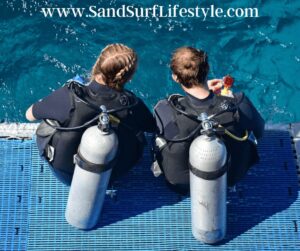Looking for a new family adventure? Scuba diving is an experience of a lifetime and there is no better way to spend this experience than with your family. There is nothing like the thrill of being face to face with marine life under the crystal clear waters.
A child cannot participate in scuba diving until they are certified. The child must go through training courses and is required to read the same materials as an adult. These training courses will help you to learn all that is needed in order to become a certified scuba diver.
Courses/Certifications:
 These courses will not only teach your child how to become a scuba diver, but will also help them to gain confidence, self-esteem, and goal-setting skills. There are three phases of scuba diving certifications:
These courses will not only teach your child how to become a scuba diver, but will also help them to gain confidence, self-esteem, and goal-setting skills. There are three phases of scuba diving certifications:
- knowledge development
- confined water dives
- open water dives
In the beginning, all the learning will take place in a swimming pool or a controlled environment. Courses will teach individuals how to be safe, use hand signals, how to breathe underwater, learn how to swim, assemble and properly use the equipment, and how to choose the right scuba gear.
Knowledge development will be a mixture of reading materials, videos, and demonstrations. It is important to understand the material, but demonstrating will help the scuba diving instructor to determine if you are ready to go out in the open water.
During the confined water dives, you will learn how to set up your scuba gear, enter and exit the water, how to get water out of your mask, buoyancy control, basic underwater navigation, and safety procedures.
You will spend most of your time in the water learning the skills that you will need for scuba diving.
Once you are comfortable with the confined diving, you will then be ready for open water dives. In this phase, you are taking all your knowledge from phase one and your skills from phase two and putting it all together.
In order for a child to receive his certification, he must take and read the same scuba diving material as an adult. By the time a child reaches the age of twelve, there are a variety of courses that can be taken. Some courses that may be available or rescue diver certifications, open water certifications, advanced certifications, or even specialty courses.
There are restrictions on how far a child is able to descend into the ocean. At all times, they must be accompanied by a parent or professional. For ages ten to eleven, forty feet is the maximum depth allowed to descend. For ages twelve to fifteen, sixty to seventy-two feet is the maximum depth.
You will receive a certification card once you have met all the qualifications to become a scuba diver. There are twelve certification levels for scuba diving. Six of those levels are for recreational purposes and the other six levels are for professional levels of scuba diving.
On your certification card, there will be a code for your certification level. The level on your certification card is important when booking diving trips as well as applying for professional positions. It also lets people know what your knowledge and skill levels are in scuba diving.
 Once you have your certification card for scuba diving, depending on the conditions of your certification, you will be able to explore the open water. There are so many surprises that you will uncover when scuba diving. Some of those discoveries may include being able to:
Once you have your certification card for scuba diving, depending on the conditions of your certification, you will be able to explore the open water. There are so many surprises that you will uncover when scuba diving. Some of those discoveries may include being able to:
- explore a sunken ship.
- dive into the depths of a blue hole.
- glide alongside a manta ray.
- be face to face with a shark.
- join a school of fish.
- witness a wild migration.
Need a New Scuba Regulator? Here Are The Seven Most Reliable Scuba Regulators To Buy.
Health Requirements:
Twenty-nine years old is the average age of a scuba diver.
However, there are many people who enjoy and love the hobby of scuba diving. It is imperative that an individual must be physically, mentally, and emotionally fit to be a scuba diver.
Please understand that not all children and teenagers should dive. If they are not mentally ready and cannot handle stress, scuba diving may not be your child. Another area that can help determine if your child is able to handle scuba diving is his or her attention span. Children also need to be able to learn, remember, and apply safety rules.
Even though there is no maximum age limit for scuba diving, there is one requirement. Anyone over the age of sixty-five must provide a detailed medical exam by their physician clearing them to scuba dive.
If there are any pre-existing conditions, there may be some accommodations. An example would be vision problems, you may be eligible for a prescription mask.
Prior to beginning scuba diving lessons, all student divers are required to complete a medical questionnaire. This is required to ensure you don’t have any conditions that can compromise your safety.
It is recommended that you get check-ups regularly to ensure your safety. If there are any issues arise, consult your doctor and your diving instructor to see if there are any workarounds.
Conclusion:
 Scuba diving is a great hobby that the entire family can enjoy. The certification courses will help you to become comfortable in the water. You will need to learn how to breathe underwater as well as how to choose your scuba diving gear.
Scuba diving is a great hobby that the entire family can enjoy. The certification courses will help you to become comfortable in the water. You will need to learn how to breathe underwater as well as how to choose your scuba diving gear.
In order for you to be able to enjoy this adrenaline sport, you must be:
● the minimum age of ten.
● certified by a scuba diving instructor.
● physically, mentally, and emotionally fit.
● know how to assemble and properly use the equipment.
Scuba diving teaches your child to be able to learn important character traits that will be able to be used in everyday life, such as confidence, self-esteem, and goal-setting. These are the main traits that will help to shape them into the best version of themselves. Areas that can be affected by those traits are their attitude, their performance in school, and the way they lead.
Please note: This blog post is for educational purposes only and does not constitute legal or medical advice. Please consult a legal expert or medical professional to address your specific needs.

